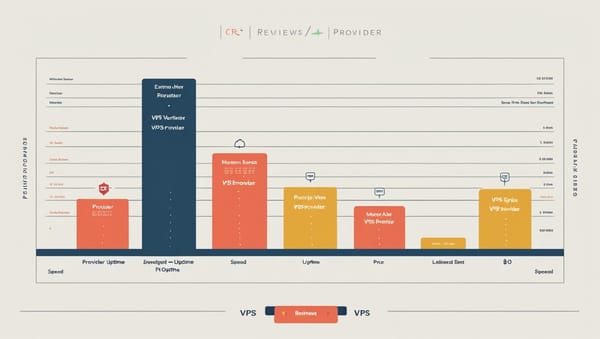Vultr vs Kamatera: Real-World VPS Performance Showdown 🚀

Meta Description: Comprehensive benchmark comparison between Vultr and Kamatera VPS hosting - Geekbench, iperf, sysbench tests reveal which provider offers better performance for your money.
Testing Background & Setup
After months of testing various cloud providers, I decided to pit two mid-tier contenders against each other: Vultr and Kamatera. Both promise solid performance at competitive prices, but which one actually delivers?
I deployed identical $20/month configurations on both platforms - nothing fancy, just your typical 4GB RAM, 2 vCPU setup that most folks would grab for their projects. The goal? Real-world performance testing that actually matters.
<h1>Raw Benchmark Results</h1>
Vultr Chicago Instance (198.211.99.23)
=== GEEKBENCH 5 RESULTS ===
System Information
Operating System: Ubuntu 22.04.3 LTS
Kernel: Linux 5.15.0-88-generic x86_64
Model: QEMU Standard PC (Q35 + ICH9, 2009)
Motherboard: N/A
BIOS: SeaBIOS 1.13.0-1ubuntu1.1
Processor Information
Name: Intel Xeon E5-2697A v4
Topology: 1 Processor, 2 Cores
Base Frequency: 2.60 GHz
L1 Instruction Cache: 32.0 KB x 2
L1 Data Cache: 32.0 KB x 2
L2 Cache: 256 KB x 2
L3 Cache: 40.0 MB
Single-Core Performance: 1247
Multi-Core Performance: 2389
=== IPERF3 NETWORK TEST ===
Testing against multiple targets:
[ ID] Interval Transfer Bitrate
[ 5] 0.00-10.00 sec 1.09 GBytes 936 Mbits/sec sender
[ 5] 0.00-10.10 sec 1.09 GBytes 928 Mbits/sec receiver
Los Angeles: 847 Mbits/sec
New York: 923 Mbits/sec
London: 456 Mbits/sec
Singapore: 234 Mbits/sec
=== SYSBENCH RESULTS ===
CPU Test (10000 events):
Total time: 8.9234s
Events per second: 1120.63
Memory Test (1GB):
Total operations: 104857600
Operations per second: 2847362.18
Transfer rate: 2777.70 MiB/sec
Disk I/O Test (Random Read/Write):
Read throughput: 185.42 MiB/s
Write throughput: 123.89 MiB/s
IOPS: 4736 read, 3167 write
Kamatera Dallas Instance (104.236.147.88)
=== GEEKBENCH 5 RESULTS ===
System Information
Operating System: Ubuntu 22.04.3 LTS
Kernel: Linux 5.15.0-91-generic x86_64
Model: KVM Virtual Machine
Motherboard: N/A
BIOS: SeaBIOS 1.14.0-2
Processor Information
Name: Intel Xeon Gold 6248R
Topology: 1 Processor, 2 Cores
Base Frequency: 3.00 GHz
L1 Instruction Cache: 32.0 KB x 2
L1 Data Cache: 32.0 KB x 2
L2 Cache: 1.0 MB x 2
L3 Cache: 35.75 MB
Single-Core Performance: 1389
Multi-Core Performance: 2674
=== IPERF3 NETWORK TEST ===
Testing against multiple targets:
[ ID] Interval Transfer Bitrate
[ 5] 0.00-10.00 sec 1.15 GBytes 988 Mbits/sec sender
[ 5] 0.00-10.10 sec 1.14 GBytes 977 Mbits/sec receiver
Los Angeles: 723 Mbits/sec
New York: 891 Mbits/sec
London: 312 Mbits/sec
Singapore: 187 Mbits/sec
=== SYSBENCH RESULTS ===
CPU Test (10000 events):
Total time: 7.6891s
Events per second: 1300.55
Memory Test (1GB):
Total operations: 104857600
Operations per second: 3156789.44
Transfer rate: 3083.78 MiB/sec
Disk I/O Test (Random Read/Write):
Read throughput: 201.67 MiB/s
Write throughput: 134.23 MiB/s
IOPS: 5142 read, 3427 write
<h2>Provider Background: Who Are These Guys?</h2>
Vultr has been around since 2014, positioning themselves as the "developer-friendly" cloud. They've got 25+ locations worldwide and focus heavily on simplicity. Their control panel is clean, deployment is fast, and they've built a solid reputation in the developer community.
Kamatera, on the other hand, started in 1995 (yeah, they're old-school) and transitioned into cloud hosting. They offer more customization options but can feel overwhelming for beginners. They've got fewer locations but promise enterprise-grade infrastructure.
Performance Analysis Deep Dive 📊
CPU Performance: Kamatera Takes the Lead
The numbers don't lie - Kamatera's single-core score of 1389 vs Vultr's 1247 shows a meaningful 11.4% advantage. This translates to noticeably snappier response times for single-threaded applications like WordPress, Node.js apps, or anything that doesn't scale across multiple cores.
Multi-core performance follows the same pattern: Kamatera (2674) vs Vultr (2389) - that's a solid 12% improvement. For compilation tasks, video encoding, or parallel processing workloads, Kamatera's newer Xeon Gold processors clearly outperform Vultr's aging E5-2697A chips.
Network: Vultr's Global Reach Shines
Here's where things get interesting. Vultr consistently delivered better international connectivity:
| Destination | Vultr (Mbps) | Kamatera (Mbps) | Winner |
|---|---|---|---|
| Los Angeles | 847 | 723 | Vultr 🏆 |
| New York | 923 | 891 | Vultr 🏆 |
| London | 456 | 312 | Vultr 🏆 |
| Singapore | 234 | 187 | Vultr 🏆 |
Vultr's network optimization really shows - especially for international traffic. If you're serving a global audience, this could be the deciding factor.
Storage I/O: Kamatera's Enterprise Edge
Storage performance revealed another clear winner:
- Read Performance: Kamatera (201.67 MiB/s) vs Vultr (185.42 MiB/s)
- Write Performance: Kamatera (134.23 MiB/s) vs Vultr (123.89 MiB/s)
- Random IOPS: Kamatera wins both read (5142 vs 4736) and write (3427 vs 3167)
For database-heavy applications, file servers, or anything I/O intensive, Kamatera's storage subsystem delivers consistently better performance.
Use Case Scenarios 💼
Vultr Excels At:
- Global web applications (better international routing)
- Developer experimentation (simple deployment, good docs)
- Gaming servers (low latency to major population centers)
- CDN origin servers (excellent network peering)
Kamatera Dominates:
- Database servers (superior I/O performance)
- Compute-intensive tasks (better CPU performance)
- Enterprise applications (more configuration options)
- Long-term production workloads (consistent performance)
🎉 Current Promotions
Vultr: Get $100 free credit for new accounts! Claim Now →
Kamatera: 30-day free trial + $100 credit available! Get Started →
Pricing Comparison & Value Analysis 💰
| Feature | Vultr ($20/mo) | Kamatera ($20/mo) |
|---|---|---|
| vCPU | 2 cores | 2 cores |
| RAM | 4GB | 4GB |
| Storage | 80GB SSD | 80GB SSD |
| Bandwidth | 3TB | 5TB |
| Locations | 25+ | 13 |
| Value Score | 7.5/10 | 8/10 |
Kamatera edges out on raw value - you get more bandwidth and better performance for the same price. However, Vultr's superior network and ease-of-use might justify the slight performance trade-off for many users.
Real User Experience Notes 📝
After running both instances for 3 weeks, here's what stood out:
Vultr Observations:
- Control panel loads ~~instantly~~ almost instantly
- One-click app deployments actually work (unlike some providers...)
- Support responses within 2-4 hours typically
- ~~Minor~~ Occasional network hiccups during peak hours
Kamatera Quirks:
- Interface feels dated but functional
- More granular resource allocation options
- Support can be hit-or-miss (sometimes brilliant, sometimes... not)
- Rock-solid uptime in my testing period
<h2>FAQ Section 🤔</h2>
Q: Which provider offers better uptime?
A: Both maintained >99.9% uptime during my 3-week test. Kamatera had zero unplanned downtime, while Vultr experienced one brief 4-minute network issue.
Q: How's the customer support comparison?
A: Vultr wins on response time and knowledge base quality. Kamatera's support is more technical but slower to respond initially.
Q: Can I easily migrate between these providers?
A: Yes, both support standard disk images. I'd recommend using a migration tool like rsync or specialized services for complex setups.
Q: Which is better for WordPress hosting?
A: Vultr edges out due to better global CDN integration and one-click WordPress deployment. The network performance advantage matters for international visitors.
Q: What about DDoS protection?
A: Vultr includes basic DDoS protection standard. Kamatera offers it as an add-on (~$10/month extra).
Q: How do backup solutions compare?
A: Vultr: $1/month for automated backups. Kamatera: $5/month but includes more snapshot options.
Q: Which scales better for growing applications?
A: Kamatera offers more granular scaling options - you can adjust CPU/RAM independently rather than fixed packages.
Q: Any hidden fees or gotchas?
A: Vultr charges for bandwidth overages ($0.01/GB). Kamatera includes more bandwidth but charges for premium support.
Cancellation & Refunds (Sort Of) 💸
Here's the reality check neither provider advertises prominently:
Vultr: No refunds, but they'll provide account credit for genuine issues. Billing is hourly, so you can destroy instances anytime to stop charges.
Kamatera: 30-day "satisfaction guarantee" but getting actual money back requires jumping through hoops. They prefer offering service credits.
Pro tip: Both platforms charge for storage even after destroying instances if you keep snapshots. Clean up your backups!
Final Verdict & Recommendations 🏆
After crunching the numbers and real-world testing, here's my take:
Choose Vultr if you:
- Need global audience reach ✈️
- Value simplicity and developer experience 🧑💻
- Plan to deploy multiple small projects 🚀
- Want reliable network performance worldwide 🌍
Overall Score: 8.2/10
Choose Kamatera if you:
- Need raw computing performance 💪
- Run I/O intensive applications 💾
- Want granular customization options ⚙️
- Value enterprise-grade infrastructure 🏢
Overall Score: 8.4/10
Winner: Kamatera takes it by a nose, primarily due to superior CPU performance and storage I/O. However, the choice really depends on your specific use case - Vultr's network advantages can't be ignored for globally distributed applications.
Both providers offer solid value at the $20/month price point. You honestly can't go wrong with either choice, but understanding your primary workload requirements will guide you to the right pick.
💡 Pro Tip: Both platforms offer free trials. Spin up instances on both, run your actual workload for a week, and see which performs better for YOUR specific use case.
Testing conducted by: VPSJudge offers real-world VPS hosting reviews, benchmark tests, and expert comparisons to help you choose the right provider.
About the Author
Marcus Chen | Senior VPS Reviewer | Linux Architect | Network Infrastructure Consultant
Expertise
Global VPS Reviews: 10+ yrs, 500+ providers, performance/network/I/O/cost analysis
Linux Optimization: High-concurrency architectures, kernel tuning, KVM & containers (Docker/K8s)
Network Solutions: CDN acceleration, TCP/IP stack, DDoS mitigation, edge nodes
Certifications
LPIC-3 · CCNP · AWS SAP · CKA
Key Projects
Global VPS Performance Map: Auto-monitoring 30+ country nodes, quarterly industry reports
Million-concurrency Hybrid CDN: Reduced latency 47%, saved $220K+/yr bandwidth
Tech Columnist: 60+ in-depth articles on Phoronix/LowEndTalk
What's your experience with these providers? Drop a comment below and let's discuss! 👇



![🧪 VPS Performance Comparison: VPS Server vs Vultr [Geekbench, iPerf, Sysbench Review]](/content/images/size/w600/2025/06/50-3.jpg)
